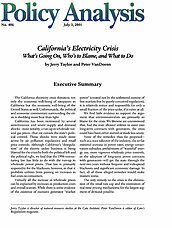The California electricity crisis threatens not only the economic well-being of ratepayers in California but the economic well-being of the United States as well. Unfortunately, the political and economic commentary surrounding the crisis is shedding more heat than light.
California has been victimized by several simultaneous and severe supply and demand shocks–most notably, a run-up in wholesale natural gas prices–that are outside the state’s political control. Those shocks were made more severe by air pollution regulations and retail price controls. Although California’s “deregulation” of the electric utility business is being blamed for the crisis by both the political left and the political right, we find that the 1996 restructuring law has little to do with the run-up in wholesale power prices. That law is primarily responsible for the blackouts, however, in that it prohibits utilities from passing on increases in fuel costs to consumers.
Virtually all the increase in wholesale prices can be explained by increases in production costs and overall scarcity. While there is some evidence of the existence of excessive generator “market power” (created not by the unfettered exercise of free markets but by poorly conceived regulation), it is relatively minor and responsible for only a small fraction of the price spike, if it exists at all.
We find little evidence to support the argument that environmentalists are primarily to blame for the crisis. We likewise are unconvinced that, had the state allowed utilities to enter into long-term contracts with generators, the crisis could have been either averted or made less severe.
None of the remedies thus far proposed–such as a state takeover of the industry, the so-far minimal increase in power rates, energy conservation subsidies, prohibitions of “wasteful” energy use, more vigorous wholesale price controls, or the adoption of long-term power contracts with generators–will get the state through the next two years without frequent and widespread blackouts and significant economic damage. In fact, all of those alleged remedies would make matters worse.
The only remedy to the crisis is the elimination of the retail rate cap and the institution of real-time pricing mechanisms for the largest segment of demand possible.

This work is licensed under a Creative Commons Attribution-NonCommercial-ShareAlike 4.0 International License.


